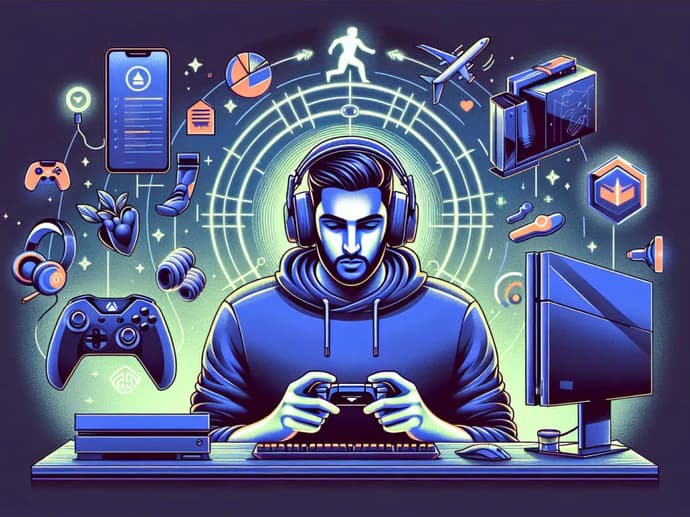
What e-sports professionalism requires of a player - see tips here

E-sports, or electronic sports, have become a major sport in recent years, with top players competing for millions of dollars in prize money. However, turning professional is not easy and requires a wide range of skills, dedication and strategic thinking.
Becoming a professional does not happen overnight, but requires systematic training, mental strength and the ability to work in a team. You also need to constantly monitor the evolution of the game and update your skills to master new strategies and metagames. E-sports has also entered the casino sector, and casino operators are one of the main sponsors of international e-sport tournaments.
Physical and mental stamina
Many people may think that e-sports do not require physical fitness, but this is a misconception. Long training sessions and competitions can be exhausting, and maintaining physical fitness is essential for endurance and concentration. Players need to take care of their diet, sleep and exercise to stay healthy and energetic.
Mental stamina is equally important, as professional players are constantly under pressure and stressful situations. They need to be able to control their emotions, focus on their performance and recover quickly from adversity. Good self-awareness and stress management skills are key.
Teamwork and communication skills
E-sport is often a team game and success depends on how well players work together. Teamwork skills and clear communication are critical in game situations where quick decision-making and seamless cooperation are crucial. Players need to be able to adapt to different roles and tasks and understand the strengths and weaknesses of teammates.
Good communication is not limited to the playing field, but also extends beyond the team, such as planning training sessions and developing strategies. Open and constructive communication promotes team unity and improves results.
Understanding the game and strategic thinking
Professional players are not only technically skilled, but also have a deep understanding of the game and its mechanics. They are familiar with the different characters, maps and objects in the game and understand how to use them in the best possible way depending on the situation. This requires continuous learning and monitoring of the game, as the metagame can change rapidly.
Strategic thinking is an essential part of e-sports. Players need to be able to plan and execute complex strategies, analyse opponents' weaknesses and adapt to rapidly changing situations. This ability is what separates top players from mediocre ones.
Branding and marketing yourself
Success in eSports is not only based on playing skills, but also on the ability to build a brand. Players are often public figures and need to know how to market themselves, build relationships with fans and partners and manage social media. This can open doors to new opportunities such as sponsorship deals and commercial partnerships.
Branding yourself requires proactivity and communication skills. You need to be visible and attractive, but also professional and reliable. A good image can support a long career in eSports.
Financial skills and career management
In the professional world of eSports, money moves in large amounts and financial literacy is an important skill. Players need to know how to manage their finances, save for the future and make wise investments. This is particularly important as e-sports careers can be short, and players need to plan for life after their career.
Managing your career also means making the right choices about contracts, sponsors and other commitments. Professional career planning and a good lawyer are important tools for building a successful and sustainable career.
Regular training and development
Continuous development is vital for a professional player. Training should be systematic and goal-oriented, focusing on both technical skills and strategic thinking. Players must also analyse their own performance and constantly seek ways to improve.
Many top players use coaches and analysts to develop their skills and improve their performance. With the help of a coach, a player can identify their strengths and weaknesses and develop the areas they need to improve.
Tips for the aspiring professional player
- Train regularly: make sure you train regularly and with a sense of purpose.
- Make sure your training is regular and regular: Take care of your physical condition, nutrition and adequate sleep.
- Improve your mental stamina: Develop stress management skills and self-awareness.
- Work in a team: practise teamwork and communication skills.
- Study the game in depth: know the game's strategies, mechanics and meta.
- Build your brand: Be active on social media and network.
- Manage your finances: Plan for your future and make smart financial decisions.
- Get feedback: take advantage of coaches and constantly analyse your own performance.
Get feedback from your team.
The popularity of professional e-sports has exploded in recent years, with several games becoming important platforms for competitive gaming. Listed below are the most important games that enable professional careers in eSports.
- League of Legends (LoL)
- One of the world's most popular MOBA (Multiplayer Online Battle Arena) games, where teams compete in strategic and intense battles.
- Another giant of the MOBA genre, known for its huge prize pools and complex strategies.
- A classic first-person shooter (FPS) that has been at the forefront of e-sports for years. CS2 is also actively featured on betting lists.
- A battle royale game where players compete individually or in teams for the title of last survivor, combining combat and building.
- A team-based FPS where players choose heroes with different abilities and fight to complete missions.
- A tactical FPS developed by Riot Games that combines CS:GO-like shooting with Overwatch-like special abilities.
- A series of FPS games, particularly popular in North America, with its own professional league, the Call of Duty League.
- Combines football and vehicles, with players trying to score goals with their vehicles; the game has quickly risen to popularity in e-sport.
- A classic strategy game that has long been a popular e-sports game, especially in South Korea.
- A digital card game in which players compete against each other by collecting and using cards strategically.
- A battle royale game where teams compete for survival, combining fast-paced combat and special abilities.
- A tactical shooting and assault game where players work in teams to perform a variety of tasks, including rescuing hostages.
- One of the first major battle royale games, still attracting professional players and large tournaments.
- A classic fighting game that has been a mainstay of e-sports, pitting players against each other with custom characters.
- A popular football game that pits players against each other on virtual pitches and has developed a strong e-sports scene.
- A fighting game that combines Nintendo's iconic characters and offers a variety of modes for competitive play.
- A fighting game classic that pits players against each other with a variety of characters and fighting styles.
- Another iconic fighting game, known for its brutal style, which has retained its place in eSports.
- Nintendo's colourful team-based shooter where players compete by colouring up areas and eliminating opponents.
- A popular battle royale game, played solo or as a team, known for its massive tournaments and prize pools.
These games offer players the chance to become professionals and compete at the highest level, often with the lure of big prize money. Each game requires its own specific skills and strategic understanding, making eSports a diverse and constantly evolving field.

Elen Stelmakh er en kreativ person som er opptatt av å fremme spillkulturen gjennom artikler og visuell design. Som heltidsansatt EGamersWorld-forfatter og designer for et spillnettsted skaper Elen ikke bare innhold, men tilfører det også energi og kreativitet.
 Roblox Anime Guardians Koder februar 2026Oppdag alle fungerende Roblox Anime Guardians-koder. Løs inn gratis Mystic Coins, Trait Rerolls, Artefakter og belønninger.
Roblox Anime Guardians Koder februar 2026Oppdag alle fungerende Roblox Anime Guardians-koder. Løs inn gratis Mystic Coins, Trait Rerolls, Artefakter og belønninger. Ikke-britiske nettkasinoer: Spill, formater og hva spillere kan forventeNettkasinoer som opererer utenfor det britiske rammeverket for pengespill, tiltrekker seg oppmerksomhet på grunn av forskjeller i lisensmodeller, spillporteføljer og...
Ikke-britiske nettkasinoer: Spill, formater og hva spillere kan forventeNettkasinoer som opererer utenfor det britiske rammeverket for pengespill, tiltrekker seg oppmerksomhet på grunn av forskjeller i lisensmodeller, spillporteføljer og... Bitcoin-kasinoer og kryptospillplattformer for britiske spillereKryptobaserte spillplattformer har blitt et merkbart segment av det globale markedet for nettkasinoer.
Bitcoin-kasinoer og kryptospillplattformer for britiske spillereKryptobaserte spillplattformer har blitt et merkbart segment av det globale markedet for nettkasinoer. De beste internasjonale nettcasinoene for britiske spillereNettkasinoindustrien er en stadig voksende sektor som er anerkjent for sin teknologi, sitt omfattende spillbibliotek og de store inntektene den genererer...
De beste internasjonale nettcasinoene for britiske spillereNettkasinoindustrien er en stadig voksende sektor som er anerkjent for sin teknologi, sitt omfattende spillbibliotek og de store inntektene den genererer...


